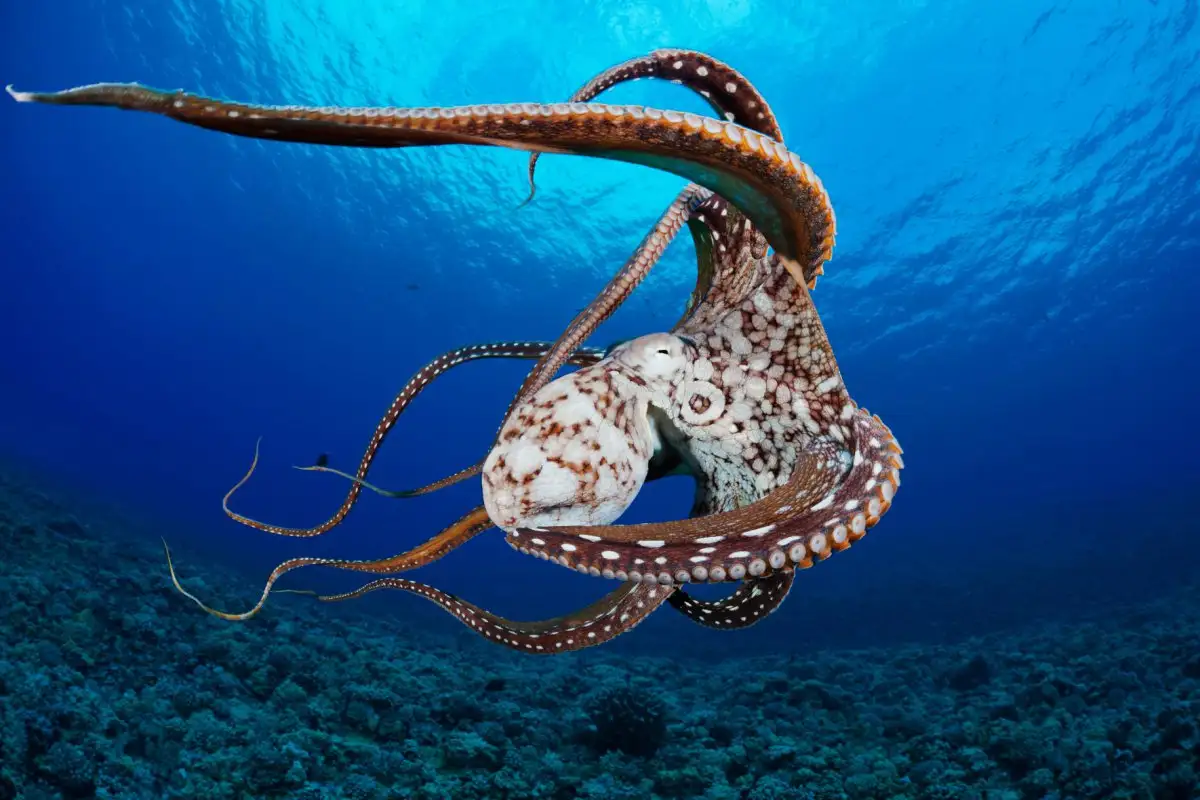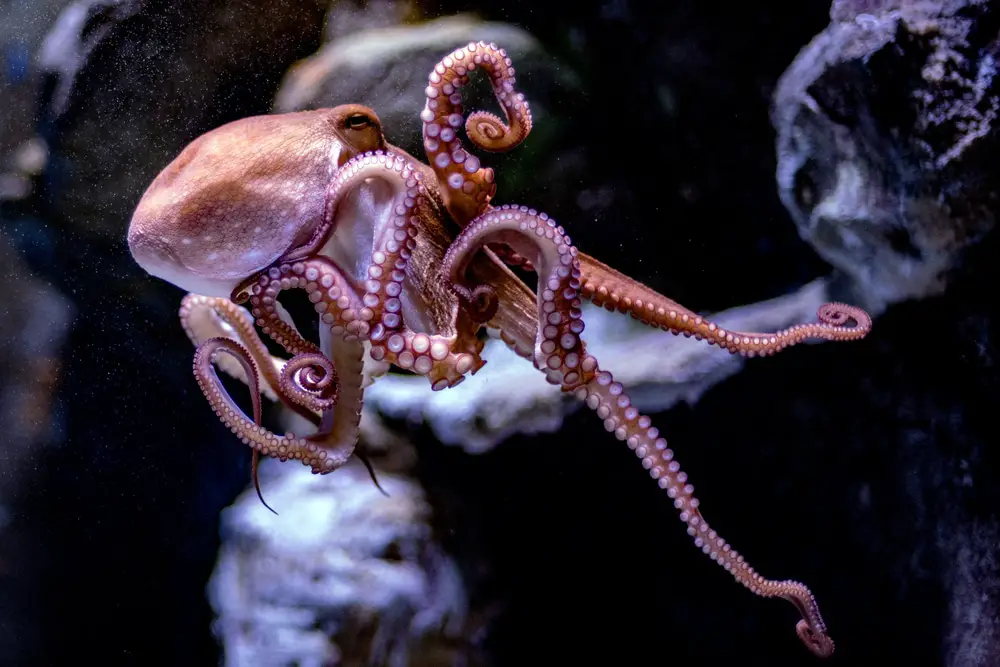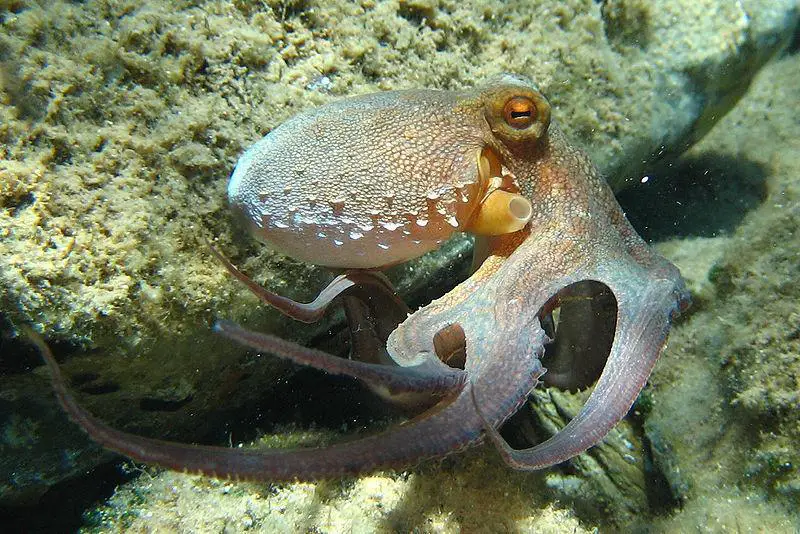How Big Is An Octopus Brain

Introduction
How Big Is An Octopus Brain: The octopus, a creature of the deep, has long fascinated scientists and marine enthusiasts alike. While its mesmerizing appearance and extraordinary abilities in camouflage and problem-solving have garnered much attention, one aspect that continues to intrigue researchers is the size and complexity of its brain.
Octopuses are cephalopods, a group of highly intelligent marine animals that include squids and cuttlefish. What sets octopuses apart is their incredible adaptability and cognitive prowess. These creatures exhibit behaviors that suggest a high level of intelligence, such as solving puzzles, escaping from enclosures, and even using tools.
The octopus brain, hidden within its soft, gelatinous body, is an intricate structure that plays a pivotal role in orchestrating these remarkable abilities. Unlike humans, who have centralized brains encased within their skulls, octopuses have a more distributed nervous system, with a large portion of their neurons located in their tentacles. This decentralized setup raises questions about how they process information and coordinate their actions.
We will journey into the depths of the octopus brain, examining its size, structure, and capabilities. We will unravel the mysteries of its intelligence and gain insights into how it navigates the complex underwater world. By understanding the size of an octopus brain, we hope to shed light on the fascinating ways in which these creatures perceive and interact with their environment.

How does an octopus have 9 brains?
NINE BRAINS
A central brain controls the nervous system. In addition, there is a small brain in each of their eight arms — a cluster of nerve cells that biologists say controls movement. This allows the arms to work independently of each other, yet together toward the same goal.
The notion that an octopus possesses nine brains is a fascinating example of nature’s innovation in neural architecture. While it may not have nine discrete brains in the conventional sense, it does have a highly decentralized nervous system, which in some ways mimics the functional specialization seen in multi-brained organisms.
An octopus’s primary brain, located in its head, serves as a central command center, processing complex information and making decisions. However, the most intriguing aspect of its neural layout is its eight arms, each of which is equipped with its own cluster of neurons or ganglia. These arm ganglia are responsible for executing precise movements and responding to sensory input immediately, granting the octopus remarkable dexterity and agility.
This distributed system allows each arm to function semi-autonomously, performing tasks like hunting, manipulating objects, and sensing the environment independently. Moreover, some of the arm ganglia can store information briefly, facilitating efficient hunting strategies and coordinated movement.
The octopus’s decentralized nervous system, consisting of multiple specialized clusters of neurons, can be likened to having nine smaller “brains” working in concert. While not identical to our concept of brains, this unique neural arrangement highlights the adaptability and intelligence of these captivating marine creatures, offering a glimpse into the diverse ways life has evolved to solve complex challenges in the natural world.
Is an octopus brain big?
An octopus’s brain-to-body ratio is the largest of any invertebrate. It’s also larger than many vertebrates, although not mammals. Octopuses have about as many neurons as a dog – the common octopus (Octopus vulgaris) has around 500 million.
The size of an octopus brain may not impress in terms of sheer volume when compared to the brains of larger mammals like humans, but it is a remarkable feat of nature in its own right. The octopus brain is relatively small, with the majority of its neurons located in its tentacles, which play a crucial role in processing sensory information and orchestrating intricate motor functions.
What truly sets the octopus brain apart is not its size, but its incredible efficiency and adaptability. Despite its compactness, it exhibits an astonishing ability to learn, solve complex problems, and adapt to various environmental challenges. This intelligence is evident in the octopus’s capacity for camouflage, tool usage, and navigating complex underwater terrain.
The octopus brain’s size is a testament to the evolutionary specialization of these cephalopods, showcasing how different animals have evolved unique neural architectures tailored to their specific needs. While it may not be big in the traditional sense, the octopus brain is a shining example of nature’s ability to optimize cognitive abilities within the constraints of different body plans and environments, reminding us that intelligence can take many forms in the animal kingdom.
Do all octopus have 8 brains?
Octopuses have NINE brains, with two-thirds of their vast knowledge spread throughout their arms. Trust the octopus to come up with a way to delegate their own brain power so they don’t need to be bothered with mundane tasks. Read on to discover how they put their diversified smarts to good use.
Contrary to a common misconception, octopuses do not possess eight separate brains. Instead, they have a highly specialized and decentralized nervous system that is organized differently from vertebrates like humans. This system allows octopuses to exhibit their incredible adaptability and intelligence.
Octopuses have a primary brain located in their head, which is relatively large compared to the rest of their body. This central brain processes complex information and coordinates various bodily functions. However, the truly remarkable aspect of their neurobiology lies in the organization of their eight arms.
Each arm of an octopus contains its own cluster of neurons or ganglia, often referred to as a “mini-brain.” These arm ganglia enable the arms to function semi-autonomously, processing sensory input and executing precise movements without constant input from the central brain. This distributed neural structure provides the octopus with exceptional dexterity, allowing it to manipulate objects and capture prey with remarkable precision.
While octopuses do not have eight distinct brains, they possess a unique and distributed nervous system that distributes cognitive capabilities throughout their body. This unconventional neural organization is a testament to the adaptability and versatility of these fascinating marine creatures in their underwater environment.
How good is an octopus memory?
Research indicates that octopuses, like us, seem to have a distinct short- and long-term memory. They seem to have something like sleep.
The octopus’s memory is truly remarkable and demonstrates its adaptability and intelligence in the marine world. While not possessing the same type of long-term memory as humans, octopuses exhibit impressive short-term and even intermediate-term memory capabilities.
Octopuses are known for their ability to learn quickly from their experiences and adapt their behaviors accordingly. They can remember complex tasks and problem-solving strategies for extended periods, sometimes even weeks. This is particularly evident in their foraging and hunting behaviors, where they can recall the locations of successful hunting grounds and recognize individual prey.
One of the most astonishing aspects of octopus memory is their ability to recognize and interact differently with humans or other objects based on prior experiences. Octopuses have demonstrated the capacity to remember specific individuals, both in positive and negative contexts, which suggests a sophisticated level of recognition and recall.
This impressive memory, while different from that of humans, underscores the octopus’s adaptability and cognitive abilities. It enables them to thrive in their ever-changing underwater environments, showcasing the importance of memory in their survival strategies. In essence, an octopus’s memory is a testament to the complexity and ingenuity of nature’s designs, revealing yet another facet of the intriguing world of these cephalopods.
Why are octopus so smart?
Genetic sequences called transposons help regulate learning. Octopuses are brainy creatures with sophisticated smarts, and now scientists have uncovered a clue that may partly explain the cephalopods’ remarkable intelligence: Its genes have a genetic quirk that is also seen in humans, a new study finds.
Octopuses are exceptionally intelligent creatures, and their remarkable cognitive abilities can be attributed to several factors that have evolved over millions of years.
Evolutionary History: Octopuses belong to the cephalopod family, which has a long evolutionary history dating back hundreds of millions of years. Their ancestors faced selective pressures that favored the development of complex nervous systems, including large brains, as a means of survival.
Predatory Lifestyle: Octopuses are skilled hunters in the ocean, often pursuing fast and elusive prey. Their intelligence is essential for problem-solving, strategy development, and effective hunting techniques. Their ability to adapt and learn quickly is a result of their predatory lifestyle.
Lack of Protective Shell: Unlike other mollusks, octopuses lack a protective shell, making them vulnerable to predators. To compensate, they rely on their intelligence for evasion and camouflage, allowing them to hide in plain sight.
Complex Environments: The marine environments octopuses inhabit are dynamic and full of complex challenges. Their intelligence helps them navigate these environments, find food, and avoid threats.
Social Complexity: Some octopus species exhibit social behaviors and interactions with conspecifics. This social complexity likely drives the development of their cognitive abilities, such as recognizing and remembering individuals.
Octopuses are smart because their evolutionary history, predatory lifestyle, environmental challenges, and sometimes social interactions have favored the development of advanced cognitive abilities. Their intelligence is a testament to the diverse ways in which life has adapted to thrive in different ecological niches.
How advanced is an octopus brain?
One of the incredible things about octopus’s is that not only do they have an advanced intelligence that lets them camouflage themselves, use tools and manipulate their environments and act as really clever hunters in their ecosystems, they do this with a brain that evolved essentially from something like a slug in the.
The octopus possesses one of the most remarkable brains in the animal kingdom, showcasing a level of sophistication that captivates scientists and enthusiasts alike. With approximately 500 million neurons, distributed not only in its central brain but also throughout its arms, the octopus exhibits a decentralized intelligence that allows for a high degree of multitasking and adaptability. This neural arrangement enables each arm to operate semi-autonomously, granting the octopus an unparalleled capacity for problem-solving and complex motor coordination.
What sets the octopus apart is its ability to learn and retain information, showcasing an impressive memory that rivals some vertebrates. This cognitive prowess extends to its mastery of camouflage, using specialized cells called chromatophores to change color and texture in an instant, rendering it nearly invisible to predators and prey alike. Additionally, the octopus demonstrates a knack for tool usage, exhibiting behaviors such as using coconut shells for shelter or manipulating objects to extract food.
Despite its astonishing cognitive abilities, the octopus remains a mysterious creature, its intelligence evolving in ways that challenge our understanding of animal cognition. The depth of its mental faculties prompts us to reconsider the nature of intelligence and consciousness, offering a tantalizing glimpse into the diverse forms of advanced cognition that can arise in the animal kingdom.
Why do octopuses have such large brains?
Octopuses boast disproportionately large brains relative to their body size, a feature attributed to their complex and dynamic marine environments. These cephalopods inhabit intricate ecosystems where quick thinking, adaptability, and problem-solving are essential for survival. Their intricate underwater realms demand acute sensory perception and sophisticated motor skills, all of which are orchestrated by their substantial neural capacity.
The octopus’s expansive brain serves as the command center for its extraordinary abilities. With a decentralized nervous system, a significant portion of their neurons is distributed throughout their arms, granting them a unique form of intelligence. This decentralized arrangement enables each arm to function semi-autonomously, facilitating a range of tasks from hunting to intricate manipulation of objects.
The octopus relies heavily on its memory to navigate the intricacies of its habitat. Remembering hunting grounds, recognizing potential threats, and recalling successful hunting techniques are crucial for their survival. Their large brains, with a staggering number of neurons, allow for complex learning and memory retention, rivaling that of some vertebrates.
The octopus’s oversized brain is a testament to the evolutionary pressures it faces in its underwater world. It is the key to its prowess in camouflage, tool usage, and problem-solving, demonstrating that intelligence in the animal kingdom can take on astonishingly diverse and specialized forms.
What is the significance of the large brain in octopuses?
The remarkable size of an octopus’s brain is pivotal to its survival and success in the intricate underwater environments it calls home. With an impressively developed nervous system, octopuses exhibit a level of intelligence that rivals many other creatures in the animal kingdom. This expanded neural capacity enables them to process a wealth of sensory information, allowing for acute awareness of their surroundings and swift responses to changes in their environment.
One of the most notable features of the octopus’s brain is its decentralized structure. This distribution of neurons not only in the central brain but also in its arms empowers the octopus with unparalleled dexterity and multitasking abilities. Each arm can operate semi-autonomously, affording the octopus an extraordinary range of motion and enabling it to carry out complex tasks with remarkable precision.
The large brain is a cornerstone of the octopus’s exceptional learning and memory capabilities. These cephalopods are adept at acquiring new skills, recognizing patterns, and retaining information over extended periods, a critical advantage in their pursuit of food and evasion of predators.
Ultimately, the significance of the large brain in octopuses lies in its pivotal role in their adaptation to the challenges of their underwater habitats. It grants them the cognitive tools needed for complex problem-solving, sophisticated camouflage techniques, and effective navigation of their dynamic environments, highlighting the profound relationship between neural architecture and survival strategies in the natural world.

Conclusion
Octopus brains, though relatively small when compared to those of humans, are intricate and highly specialized structures. Their distributed nervous systems, with a significant concentration of neurons in their tentacles, enable them to process information and exhibit astonishing behaviors, including problem-solving, camouflage, and tool usage. This decentralized arrangement challenges our conventional understanding of intelligence, suggesting that cognitive abilities can manifest in diverse ways across the animal kingdom.
The study of octopus brains not only offers a deeper appreciation for the complexity of marine life but also provides valuable insights into the evolution of intelligence. It underscores the importance of considering different neural architectures when exploring the potential for cognition in non-human species.
As we continue to unravel the mysteries of the octopus brain, we are reminded of the vast diversity of life on our planet and the limitless potential for discovery in the natural world. The humble octopus, with its small yet astonishingly capable brain, serves as a testament to the wonders that await those who dare to explore the depths of the oceans and the intricacies of the animal kingdom.



